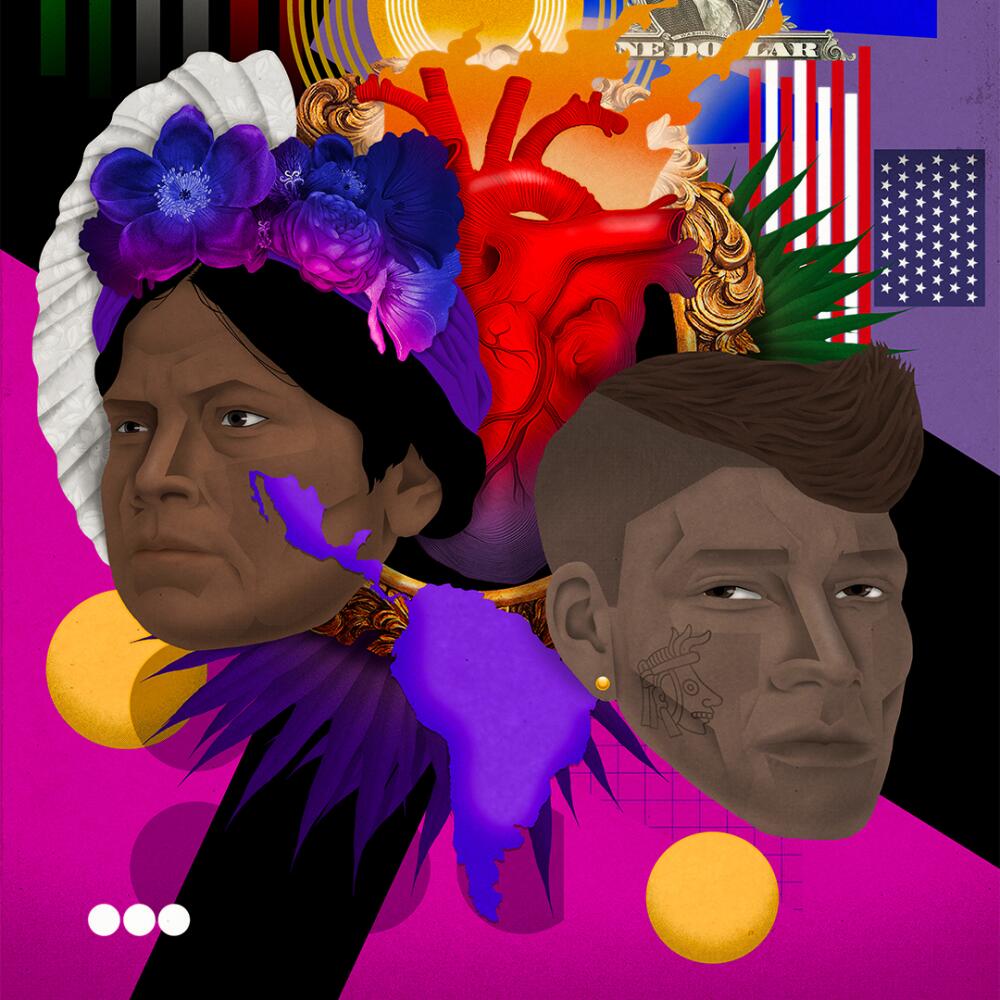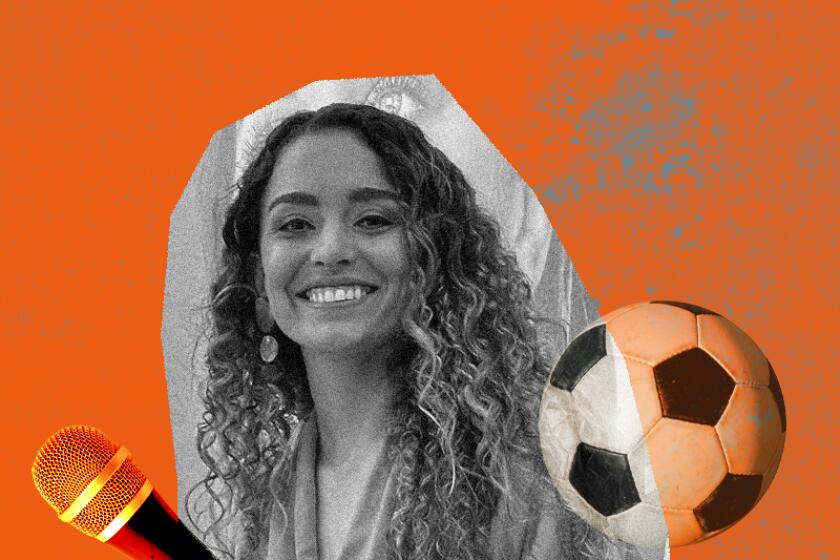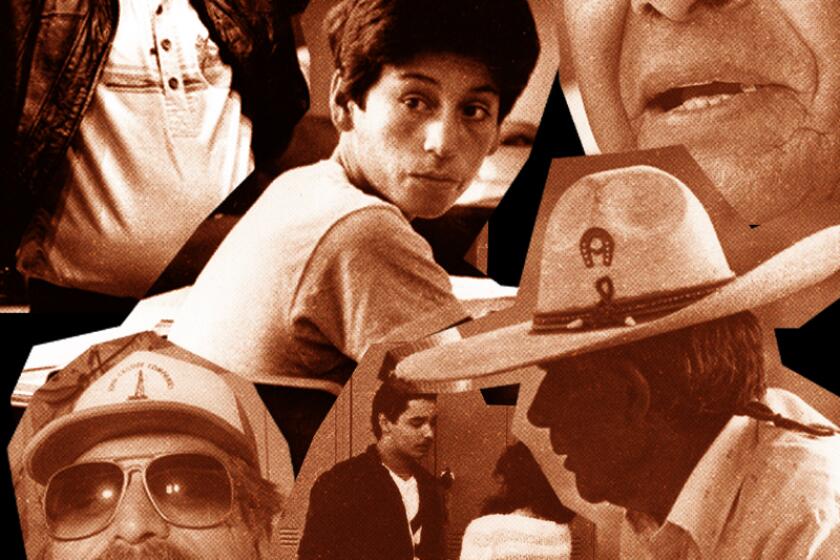
)
- Share via
In 2022, I moved to Miami to start a new job. One summer night I requested an Uber from the millennial downtown neighborhood of Wynwood to the inland Venezuelan suburb of Doral. The Venezuelan driver asked me in Spanish: “Where are you from?”
“Oaxaca,” I replied.
He was confused. He had never heard of a country with such a name. As I sat in the back seat of the car staring at the downtown Miami skyline, there was a stubborn resistance within me to name my country — Mexico.
I was ashamed to be from Mexico but profoundly proud to be born in Oaxaca. Until that night in Miami, “Oaxaca” and “Mexico” were separate entities for me. I had refused to add “Mexico” to the “Where are you from?” questions because I had become numb to Mexican nationalism.
At the Women’s World Cup, Telemundo puts together the first all-female commentary team for Spanish-language TV in the United States.
It’s not that I didn’t know anything about Mexico. In Oaxaca, I grew up with a deep sense of patriotism and honor stemming from family bonds and strengthened by my community’s traditions. Every afternoon, my grandfather would read me a book on Mexico’s history after watching cartoons on Mexican TV. Around the age of 8, I recited poems about Mexico at civic events.
At the time, I believed all Mexicans grew up like me — in a land like Oaxaca where the “good families” spoke eloquent Spanish alongside our Indigenous language, where people wore gold jewels over traditional garments to show off their class status and where post-primary education is demonstrated by the way you hold your large tortilla when eating mole.
Because in Oaxaca, education and tradition are everything.
In an ironic way, the United States introduced me to the real Mexico when I migrated in 2003. In California, I learned that not all Mexicans were raised like me. Some can be just as racist as Americans. I did not understand why some Mexican immigrants had hatred for Oaxaca but I often felt the anti-Indigenous prejudice.
Did this prejudice stem from the fact that a Oaxacan dictator ruled Mexico for 31 years? I wasn’t sure. But by the time college came along, Oaxaca became my only country. I developed an egocentric obsession with the greatness of my land, and its ability to shield me from common Mexican stereotypes and the insensitive jokes I heard growing up in Mexican American neighborhoods.
I was resentful, angry and obsessed with showing the world how different Oaxaca is from the rest of the place my grandfather and other Oaxacans call: “The Mexican Republic.” I felt ashamed to be from Mexico until I moved to Miami.
Seeing Walter Mercado memorabilia being sold at the mall in Puerto Rico makes you think about what happens to queer icons.
Miami is what people perceive it to be — mixed drinks on rooftop bars overlooking the ocean and a Latin America as contemporary as a Carlos Fuentes novel. I loved Miami and Miami loved me. People living in the city were confused as to what country I belonged to — perhaps I came from Aruba, maybe the Middle East or even Panama.
One Miami night, I met a bartender from Cali, Colombia, at a restaurant who welcomed me to his bar with a loud “Oaxaca, México!” as he poured my drink. We immediately bonded over our joie de vivre and Mezcal because it has a similarity to Colombian brandy — aguardiente. I realized that Colombians’ obsession with Oaxaca goes beyond our strong alcohol. In the past years, Colombian tourism in Oaxaca has increased by 35%.
It was in Miami’s suburb, Doral, where I tried my first arepa. The Venezuelan waiter stayed by my side the entire time, diligently watching me. When I asked him what he was doing, he replied: “I am here because I want your first arepa to be your best experience.”
In this same neighborhood, a Venezuelan man told me that Caracas has a square dedicated to the first Indigenous president of Mexico, Benito Juárez. If at this point you do not know what Juárez did, I recommend you do some research because I am quite exhausted to explain it unless we discuss Mexican history over Oaxacan old fashions and cigars.
My Uruguayan friend told me that there is a common joke among the residents of Miami that Argentinians are allowed free access to fancy venues because the Argentinian economy is not doing so well. It is for this reason that an Argentinian man once formally congratulated me in Spanish: “Congratulations! The Mexican peso is doing good. I wish I can say the same about Argentina.” I took the compliment on my grandfather’s behalf because he would have loved to hear that Mexico is finally doing well.
As a good Oaxacan, melancholy eventually came over me in times of infatuation. And Miami was no exception. In a Mezcal bar, I requested that the bartender say: “Viva Oaxaca!” every time he served me a glass of Mezcal. I do not remember how many times I heard these words or how many glasses I drank.
More than four decades ago, groups of Black and Latino journalists embarked on an endeavor to tell stories about their communities that the Los Angeles Times was failing to showcase.
I was tasting the Mezcal drops falling out of the glass to my fingertips and onto the palm of my hand. I could feel the stares of the DJ whose eyes were attentive to my manners. He played “Massive” by Drake because I am sure I was giving the impression of a broken heart, but no one broke my heart in Miami. I was drinking for my former self — Noé, the favorite grandson, who was resentful of Mexico for not loving him as much as he thought he deserved.
In my Uber ride from downtown Miami to Doral, the Venezuelan driver asked me:
“Oaxaca?”
“Oaxaca, Mexico,” I finally explained.
“Oh, Mexico! How beautiful that country is!” he exclaimed.
“Yeah, it is.”
He continued: “And the food! You have this sauce, mole! There is a sweet mole. Oh God! So sweet! They put chocolate in it. Where is that mole from?”
“From my land, Oaxaca,” I answered.
That night in Miami — from downtown to Doral — I reconciled with my country with a little help from my beloved Latin America.
Noé López has a PhD from the University of Texas at Austin and works in finance and digital banking. His writing and research focus on the socioeconomic development of his homeland, Oaxaca. @noelpzoax
More to Read
The Latinx experience chronicled
Get the Latinx Files newsletter for stories that capture the multitudes within our communities.
You may occasionally receive promotional content from the Los Angeles Times.









